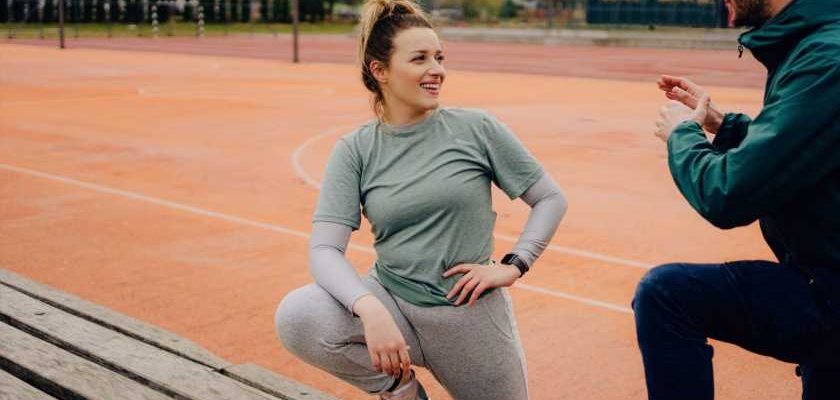Should you get a running coach? Here’s how to find one
There’s endless free information online about running, but having a personal running coach can be a gamechanger for your training – even if you’re a complete beginner.
Running is one of the most straightforward sports you can get into. It’s widely accessible and, apart from a good pair of trainers (which do, admittedly, come at a cost), you don’t need any equipment to get started. The internet is also full of free information about how to progress your running. If you follow a few simple rules (start off slowly, do your strength training, stretch before heading out), you’ll be fine.
When it’s that simple, why would anyone bother paying for a personal running coach?
Well, in the same way as a PT can help you get the most from lifting heavy bits of iron, having a coach can be hugely helpful – whether you’re a beginner runner looking for structure and guidance, or are more experienced and hoping to smash a marathon PB or break a running rut.
You may also like
How to run faster: do you really need to do speed workouts to run a faster 5k?
It’s worth saying, of course, that not everyone can afford a coach and that’s where run clubs are invaluable. Join a local club (usually for a nominal subscription) and you’ll get coaching on a weekly basis for next to nothing. If you can afford it, though, some focused professional attention can be invaluable.
Tasha Thompson, founder of Black Girls Do Run UK, has been running since 1999. Like so many of us who live in city centres, Thompson’s training was limited to London roads – leaving her unprepared for tackling new terrain.
Earlier this year, however, she decided to enter a trail race and realised that she needed professional help. “I had very little experience of trail running, and was very nervous about the unpredictable terrain,” she tells Stylist. Thompson’s coach, Rachel Murphy from She Runs Outdoors, not only trained her for the trails, but she pushed Thompson to try – and achieve – things she didn’t think she could do.
“Being coached had a powerful, positive impact on my running. It made me push myself further and leave my comfort zone,” says Thompson. “[Training alone] I would occasionally run hill repeats, but I would only do five reps. Rachel’s plan had me doing 10 hill reps, and at first, I thought I wouldn’t be able to do all of the sessions, but guess what? I did it and I loved it!”

3 ways running coaches can help you to achieve your goals
They’re your own personal cheerleader
One of the many benefits of having a personal running coach is that they double as your own cheerleader. Running can be a solitary hobby; unless your friends or partner run too, you don’t always have someone to share the highs and lows with. But part of your coach’s job is to listen to your concerns and motivate you to stay on track to achieve your goals. “I’m there at the end of a call, text, e-mail, or Zoom to offer advice,” says Murphy. “I help [my athletes] set goals and find self-belief to challenge themselves.”
We know consistency is key, and this is especially true with running. Every runner has experienced a period when lack of motivation has gotten the better of them; before you know it, it’s been weeks since you laced up. Having a coach gives you someone to stay accountable to.
“The accountability for training, of course, lies with an individual,” says Lewis Moses, head coach at New Levels Coaching. “But I also know the power of reporting back to a coach and having someone checking in with training.”
Daniela Bragato, a London-based hypnotherapist and mindfulness teacher, hired a coach when she signed up for her second half marathon this year. She found that training with a coach kept her running more consistent. “[Having a coach] was extremely helpful in terms of motivation because, although I love running, there were definitely days where I wasn’t motivated. I knew I could share this with him and get the motivation I needed to keep going.”
Coaches create personalised plans
While there a million and one free training plans to be found online, they’re not going to give you the same level of adaptability as a plan written specifically for you.
“[Generic plans] don’t know what level of runner you are and can’t tell you when to take extra rest to avoid over-training or getting injured,” says Murphy. “Generic plans don’t understand you, the individual, and your other commitments.”
A good coach will work closely with you to understand your personal circumstances including your level of fitness, your lifestyle and how much time you realistically have to train. Some coaches will even take into account your menstrual cycle and create a plan around how you feel and your physical capabilities at different stages of your cycle.
You may also like
Running tips: 4 ways strength training makes you a better, faster runner
Beginners get a solid foundation
When you start out running, you think that all you need to do is, well… run. And while that’s true, many beginners make the mistake of doing too much too soon – whether that’s in terms of pace, distance or both. This is a perfect recipe for injury and why so many people can be turned off running.
“The biggest benefit for beginner runners getting a coach is that it helps them to get a structure to their running lives, as it’s sometimes easy to feel a bit lost with your training without a coach,” says Moses. “A coach can also provide valuable feedback on running technique, especially during track or speed workouts.”
Murphy adds: “A coach can guide and nurture an athlete to safely increase their running sensibly. I’m finding women are wanting to invest in themselves. Just like paying for a personal trainer at the gym, going to a yoga class or getting a life coach, they are seeing that investing in a coach helps them to progress and stay motivated to run.”
How to find the right running coach for you
“[Coaching] is an investment in your progress. Being coached can make a huge difference to your fitness and confidence levels and every woman, wherever they are in their running journey, can benefit from one,” says Thompson.
Working with a running coach who you click with is key. If it’s something you’re thinking about, check out these tips on finding the right one for you.
Murphy’s tips:
- A coach should continue learning and be qualified.
- Don’t assume that if a coach has won races or is fast that they will be the best coach – you don’t have to be a fast runner to be a good coach.
Bragato’s tips:
- Always have a discovery call first to see if you click with them and if they are the best person to support you.
- Don’t be afraid to ask lots of questions and share feedback with them in terms of what’s working and what isn’t working so that they can adjust the plan. Having a running coach is great but don’t forget to trust yourself.
Thompson’s tips:
- Look around and find someone who aligns with your running values. If you are a “finish lines rather than finish times” runner, don’t use a coach who is all about trying to smash your race time every single race.
- Ask other runners if they can recommend a coach. Members of your local running club or Parkrun will know a few.
Images: Getty/Phil Hill
Source: Read Full Article
